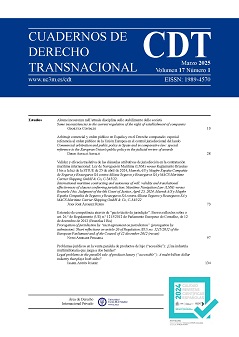Alcune incoerenze nell’attuale disciplina sullo stabilimento delle società
DOI:
https://doi.org/10.20318/cdt.2025.9320Palabras clave:
Libertà di stabilimento delle società, diritto internazionale privato delle società, esigenze imperativeResumen
In una recente sentenza, la Corte di giustizia ha nuovamente affrontato il problema della libertà di stabilimento delle società e del rapporto che questa presenta con le disposizioni nazionali di diritto internazionale privato. Benché la decisione non costituisca una novità, essa pone con urgenza il problema della tutela dei soggetti che rischiano di essere pregiudicati da uno spostamento della sede all’estero ovvero dal cambiamento della legge applicabile, quali i creditori, i soci di minoranza e i lavoratori.
La situazione si è complicata ulteriormente, perché, a seguito della sentenza della Corte di giustizia nel caso Polbud e della direttiva 2019/2121, esistono ora due diverse modalità di esercizio del diritto di stabilimento da parte delle società. Dette diverse modalità, seppure nettamente distinte dal punto di vista giuridico, risultano scarsamente coordinate proprio sotto il profilo della tutela dei soggetti che avevano fatto affidamento su un determinato assetto giuridico della società. Per risolvere l’aporia, il legislatore dell’Unione dovrebbe intervenire completando l’armonizzazione normativa del settore ovvero con l’adozione di un regolamento (c.d. Roma V) sulla legge applicabile alle società.
